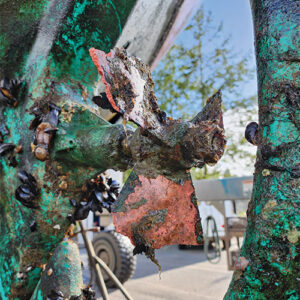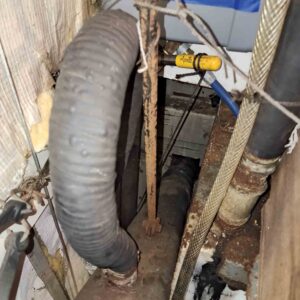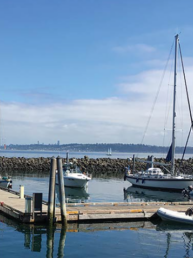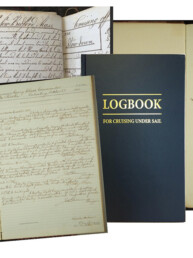When spring arrived, vessel purchase and selling season in the Pacific Northwest was upon us. I could tell because my phone exploded with phone calls from folks reaching out to me shortly after buying their boat with concerns that something wasn’t right.
Many people purchasing vessels are very diligent about hull surveys during the purchase process, but few go much further than that. Hull surveys are extremely important, whether it’s for insurance or pre-purchase, and a good hull surveyor can help you avoid big problems and the big bucks that are often required to resolve those issues. However, depending on the surveyor you’ve hired, a hull survey is somewhat limited in how deep it can go. To gain the most insight, there are more specific inspections and surveys that cover certain systems in detail such as rigging, electrical, and mechanical, which are very handy when trying to understand everything you can about a boat. Very few inspectors can provide expertise in all these fields, so that is why you may want to bring in these specialized professionals to help paint a more complete picture of what you are about to get into.
MECHANICAL SURVEYS

A mechanical survey is an inspection that is typically performed alongside the hull survey during the purchase process. It also can be done after the purchase of a vessel to help determine the needs of the vessel’s propulsion plant and what steps come next in terms of maintenance or repair.
Mechanical surveys should only be performed by certified marine mechanics, marine engineers, or specialists for the type of propulsion plant the vessel has. What that means is your handyman neighbor who fixes cars probably isn’t the one to call when it comes to performing this type of assessment. Mechanical surveys are normally written up in similar fashion to a hull survey and should cover the engine compartment components in depth with pictures, descriptions, and recommendations.
When performing a mechanical survey, I’ll typically work with the hull surveyor during the haul out of the vessel, and our surveys will overlap on a few things. Many times, the hull surveyor and I will collaborate on our reports so they make sense to our clients. The more complete any survey can be, the better: this means that a cold start of the engine(s), haul out, and sea trial is pretty important for gaining the most information you can. If all those things aren’t possible, a good marine mechanic that is familiar with the engine will be able to spot a lot of things you may not have even noticed based on its appearance, function, and serviceability.
A marine mechanic or engineer who is familiar with the specific brand or model of engine can also advise you on some of the more predictable ownership struggles you may potentially encounter. These can include potential lack of new or used parts, or support for the engine in today’s market—which can be a deal breaker regardless of how well the engine may run at the moment.
ELECTRICAL SURVEYS
An electrical survey is a type of audit and inspection of the vessel’s electrical systems; very similar to that of a mechanical survey. This should be performed by someone who is a certified marine electrician, or marine electrical engineer, or specialist who is familiar with these components and knows what to look for.
The electrical survey focuses primarily on AC and DC systems, and also will overlap with the hull and mechanical surveys. Typically, during a mechanical survey, I will inspect the engine’s starting and charging systems, and the panels and other components related to the drivetrain of the vessel, but I won’t be inspecting behind the main electrical panel unless I am asked to include that. A hull surveyor may also look into aspects of the electrical system, but not necessarily cover everything in their report either. Inspections like this typically are done after a purchase to help owners get a scope of work that needs to be done, but also can be completed during the pre-purchase survey process.
WHY ARE ALL THESE INSPECTIONS IMPORTANT?

On most vessels that I have worked on, the engine and electrical systems are by far the most expensive to repair. While other components such as rigging, decking, fiberglass, and sails can be “up there” in price, in relation to a new engine or a complete rewire, they don’t really compare. A good hull survey is based on the experience of the hull surveyor, and I have been fortunate to work alongside and, importantly, learn from several of these folks. I have also gotten to include their knowledge in my findings to help people determine what they need to do and whether they are up for the task. No one wants to buy a vessel with hidden problems, so this is really helpful for determining whether to walk away, create a task list or scope of work that you can be prepared for. The up-front expense can seem daunting, but having the ability to walk away knowing you’re avoiding disaster is absolutely worth it.
These inspections also provide the client with the opportunity to learn about the systems, ask questions about serviceability, and begin inquiring about where they can take the vessel to be repaired. If owners are stuck on a decision and are asking me what I think after the survey process, I can’t tell them yes or no; but I can tell them to imagine they already own the vessel, and to start reaching out to gather information as if they needed to fix the boat right now. Sometimes that can really help them get a feel for where to find parts, who to hire, and how much it may cost to have the work professionally completed. A wise friend once told me this, and I have followed this advice as well as shared it with many folks, “Boats are like buses—don’t get in front of one because there is always another one coming.”
Whether you are purchasing a new-to-you vessel, or are planning a complete refit and looking to get a scope of work to be done, it is always wise to have an inspection done to answer some important questions you may have. A good inspector will be unbiased, but they can offer some great insight into what the vessel may have in store projectwise. From cheap boats to expensive yachts, learning as much as you can before you make any decisions will pay off in the long run, and can ensure you have an enjoyable experience out on the water. Ask as many questions and glean as much information as you can before moving forward. This alone will help you build a foundation for a rewarding boating experience.
Meredith Anderson is the owner of Meredith’s Marine Services, where she operates a mobile mechanic service and teaches hands-on marine diesel classes to groups and in private classes aboard clients’ own vessels.






